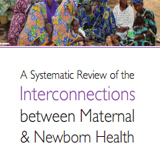
Poor maternal and newborn health is a significant contributor to the burden of disease in developing countries: worldwide approximately 350,000 women die during pregnancy and childbirth every year, and an estimated four million babies die in the first four weeks of life. The health of a mother and her newborn are closely linked, with most maternal and newborn deaths caused by the poor health of the mother before or during pregnancy, or by poor quality care during and immediately after childbirth.
Relatively few studies have examined how interventions affect both women and newborn children, identified synergies between interventions, or assessed the impact of efforts to integrate these interventions across the continuum of care. In close collaboration with researchers at Aga Khan University, Family Care International (FCI) undertook a program of work to highlight these interconnections and identify common advocacy messages to promote investment in and implementation of evidence-based interventions found to be beneficial to both women and newborns. A systematic review assessed recent and on-going research of the impact of potential interventions on maternal and newborn outcomes, with a particular emphasis on linkages between the two. Key conclusions included:
- maternal, fetal, and newborn health are strongly interconnected
- a number of key interventions have beneficial impacts on mortality and morbidity for women and for their newborns
Building on the findings emerging from the systematic review (being prepared for publication in a peer-reviewed scientific journal later in 2012), FCI and Dr. Zulfiqar Bhutta of Aga Khan University developed core advocacy messages.